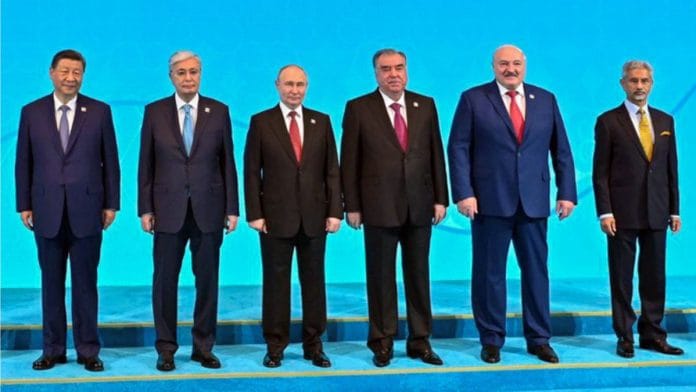The sands of global geopolitics are perennially shifting, reshuffling the contours of the world order that has been in flux since the end of the Cold War. Recently, the major force at play has been the relative decline in the power of the United States and its Western allies, juxtaposed by the rise of China and Russia’s attempt to recuperate the losses following the Soviet Union’s collapse.
Concurrently, middle powers like Brazil, India, Indonesia, Saudi Arabia, South Africa, and Turkey are gaining geopolitical heft not only because of their growth potential but also because of their ability to act as ‘swing states’.
For India, the advantages of being a swing state are derived from its geographic size and location, along with its demographic profile, military strength, diplomatic heft, economic potential, and technological promise. Its foreign policy has largely been rooted in the politico-strategic context of the issues at hand.
In particular, New Delhi has maintained distance from military alliances while cooperating with powers where there is a convergence of interests and which are personified by descriptors like, ‘open and free Indo-Pacific’ and so on.
Swing state opportunities
India’s position as a swing state has been significantly strengthened by its growing ties with the USA and its allies, while simultaneously preserving, to a considerable extent, its historically close relations with Russia. However, this position has been complicated by China’s aggression in the Northern Border region since 2020. Despite several rounds of talks between military commanders, a breakthrough remains elusive regarding Chinese incursions in the Demchok and Depsang sectors.
While diplomatic relations with China have remained frozen, economic ties have paradoxically surged, characterised by an increase in India’s imports. This dichotomy between military tensions and burgeoning trade exemplifies the complexities inherent in India-China relations that hold both promise and peril. For a swing state, such relationships could be leveraged depending on the context of the issues at stake.
Prime Minister Modi reversed his earlier decision to participate in the 24th summit of the Shanghai Cooperation Organisation (SCO) in Astana on 3-4 July. India was represented by External Affairs Minister S Jaishankar, who held talks with Chinese Foreign Minister Wang Yi before the summit commenced.
Anodyne statements on the need to improve relations followed. Overall, the signalling indicates that India does not expect much change from the existing relations with China and sticks to the formulation that unless the territorial status quo is restored, there will be no progress in improving relations.
New Delhi has also surmised that China’s military moves in the Northern Borders are linked to its primary geopolitical confrontation with the USA. China possibly figures that keeping India tied up in the Himalayas may provide it more leeway in the ongoing power play for military dominance in the Indo-Pacific.
In strategic terms, India must make its political moves in such a way that thwarts China’s gameplan. It can enhance its political and military strength by leveraging relations with the USA and allies as well as Russia.
Also read: Amid tensions with China, Philippines says BrahMos a ‘credible defence’
Counterweight to China
India’s swing state potential is also reflected in its membership of the SCO, though this grouping is more representative of China and Russia’s combined efforts at curbing the USA geo-strategically, primarily in Central Asia and adjoining areas of West and South Asia. The list of SCO member states, observer states, and dialogue partners indicates that proximity to China or Russia is a major factor for representation in the SCO.
However, lurking below Russia and China’s apparent bonhomie is the former’s inability to stem the inroads China is steadily making in Central Asia, which has historically been under Russian control. While this acceptance is based on an adverse power balance that tips in China’s favour, the salience of the matter for Russia does not disappear. It is very likely a temporary compromise to deal with a larger threat from the USA.
So, in the context of Indo-Russian relations, India’s presence in the SCO could provide some counterweight to China. Whatever might have been the rationale for Modi not attending the SCO meeting, it does not bolster India’s status as a swing state.
In terms of absolute power, India’s position is not likely to change in comparison with China. But using absolute power as a conceptual model leaves one blind to the fact that power is a relational variable. China’s major effort at applying power in the practice of statecraft has to be directed toward the USA and its allies. This provides some space for India to address the prevailing military and economic power differential.
If India wants to exploit the space offered by China’s multiple conflicts with diverse adversaries, its foreign policy must tread the tightrope of a swing state. But more importantly, it must get its domestic act together in terms of governance, policy formulation, legal frameworks, law and order, and infrastructure building.
The collapsing bridges in Bihar, the Delhi airport roof accident, and the recent parliamentary discourse are symptomatic of the larger Indian domestic malaise. It is apparent that the major obstacles hindering its development, security, and international standing are rooted internally. The enemy is within us.
Lt Gen (Dr) Prakash Menon (retd) is Director, Strategic Studies Programme, Takshashila Institution; former military adviser, National Security Council Secretariat. He tweets @prakashmenon51. Views are personal.
(Edited by Prasanna Bachchhav)






